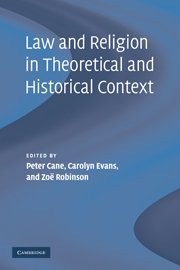Book contents
- Frontmatter
- Contents
- List of Contributors
- 1 Introduction
- 2 The moral economy of religious freedom
- 3 Understanding the religion in freedom of religion
- 4 Why religion belongs in the private sphere, not the public square
- 5 Pluralism in law and religion
- 6 The influence of cultural conflict on the jurisprudence of the religion clauses of the First Amendment
- 7 From Dayton to Dover: the legacy of the Scopes Trial
- 8 A very English affair: establishment and human rights in an organic constitution
- 9 Days of rest in multicultural societies: private, public, separate?
- 10 Australian legal procedures and the protection of secret Aboriginal spiritual beliefs: a fundamental conflict
- 11 Secular and religious conscientious exemptions: between tolerance and equality
- 12 Law's sacred and secular subjects
- 13 Freedom of religion and the European Convention on Human Rights: approaches, trends and tensions
- Index
- References
7 - From Dayton to Dover: the legacy of the Scopes Trial
Published online by Cambridge University Press: 07 July 2009
- Frontmatter
- Contents
- List of Contributors
- 1 Introduction
- 2 The moral economy of religious freedom
- 3 Understanding the religion in freedom of religion
- 4 Why religion belongs in the private sphere, not the public square
- 5 Pluralism in law and religion
- 6 The influence of cultural conflict on the jurisprudence of the religion clauses of the First Amendment
- 7 From Dayton to Dover: the legacy of the Scopes Trial
- 8 A very English affair: establishment and human rights in an organic constitution
- 9 Days of rest in multicultural societies: private, public, separate?
- 10 Australian legal procedures and the protection of secret Aboriginal spiritual beliefs: a fundamental conflict
- 11 Secular and religious conscientious exemptions: between tolerance and equality
- 12 Law's sacred and secular subjects
- 13 Freedom of religion and the European Convention on Human Rights: approaches, trends and tensions
- Index
- References
Summary
Introduction
On 10 July 1925, in the Rhea County Courthouse in Dayton, Tennessee, Judge John T. Raulston of the 18th Circuit Court called upon Reverend Cartwright to open the proceedings for the day with a prayer, a practice that was repeated at the start of proceedings on each day of the matter before the court. Reverend Cartwright duly called upon God to ‘grant unto every individual that share of wisdom that will enable them to go out from this session of the court with the consciousness of having under God and grace done the very best thing possible and the wisest thing possible’. And so began the case of State of Tennessee v. John Thomas Scopes (Scopes Trial). Scopes, a teacher at Rhea County High School, appeared before the court charged with breaching section 1 of Tennessee's so-called Butler Act. This Act, adopted in March 1925, prohibited the teaching, in Tennessee's public educational institutions, of ‘any theory that denie[d] the story of the Divine Creation of man as taught in the Bible, and [the teaching] that man … descended from a lower order of animals’.
The Scopes Trial was the first case in which the teaching of evolution in American public schools was brought before the courts. A number of cases followed in subsequent years. There is every indication that this stream of litigation will continue into the future.
- Type
- Chapter
- Information
- Law and Religion in Theoretical and Historical Context , pp. 123 - 156Publisher: Cambridge University PressPrint publication year: 2008

